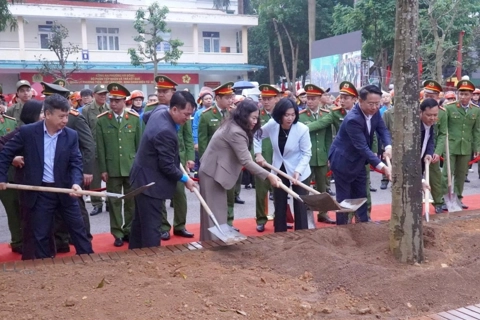Social Affairs
How Australia prepares manpower for Vietnam in Industry 4.0?
May 16, 2019 / 12:36 PM
Industry 4.0 will require Vietnam lots of efforts to tap its potential and Australian educational institutions get ready to make the goals attainable.
Australia, with a strong education ties knotted with Vietnam over the past decades, has been active in supporting the preparations for the country’s high quality manpower in the Fourth Industry Revolution.
In recent years, the matured and diverse Vietnam-Australia relations, typically with the bilateral relationship elevated to a Strategic Partnership, has encompassed cooperation on a wide range of issues, including education.
Accordingly, Australia has intensified its support to Vietnam through a specific Memorandum of Understanding (MoU) on vocational education and training as well as a broader MoU on education within the Australian Speakers and Partners in Research Education and Skills (ASPIRES) with an aim to help Vietnam get ready for Industry 4.0.
With an effort to brace the path ahead, universities from Australia have helped bring together expertise in entrepreneurship and innovation to co-create with industry an outstanding student learning experience.
Swinburne University of Technology has come up as a typical model for the well-prepared path to Industry 4.0 through its student-centered training programs and its experience has helped partners address challenges as well.
The university’s Design Factory Melbourne (DFM), meanwhile, provides the environment and mindset for industry, students, and researchers to work together on wicked challenges. Through interdisciplinary collaboration, they create the conditions to spark innovation.
Notably, the International Alliance between Swinburne University of Technology and FPT University (FPT Education) both marks a new chapter of their long-standing collaboration and will bring to Vietnam Australia’s global education, research and innovation expertise in information and communication technology, business, and media and communication.
Swinburne, which is among the world’s top 50 Under 50 list, will provide well-designed undergraduate programs to ensure students who undertake these degrees in Vietnam have access to the exact same quality of education as those in Australia.
The strategic partnership is expected to help prepare young individuals to foster in a changing world as Vietnam embrace Industry 4.0.
Insiders’ preparations
Professor Duncan Bentley, deputy vice-chancellor (Academic) of Swinburne University, said that the school’s vision which is to be a world-class institution, creates social and economic impact through science, technology, and innovation.
The programs, which are built upon three key pillars namely undertaking cutting-edge research with impact, developing future-ready learners, and being a truly innovating enterprise, enable students to be confident with enterprising skills to solve complex problems and become adaptive global citizens, the professor revealed at a meeting held in Hanoi on May 14 under the support of the Australian Department of Education and the Vietnamese Ministry of Education and Training.
With strengths in technological researches and tightened relations with the Australian government and partners around the world, Swinburne is good at designing and implementing Industry 4.0 projects.
DFM, which works as a mental and physical platform devoted to interdisciplinary project-based learning, will provide learners with good community and culture in favorable space and environment, the professor said.
Professor Alan Kin Tak Lau, pro vice-chancellor (International Research Development) of Swinburne University, described advanced teaching programs based mostly on digital research and innovation capability platform, ranging from big data analytics, cybersecurity, advanced visualization, automation, internet of things (IoT), and artificial intelligence.
Swinburne University, with a well-equipped facility network namely DFM, Business Incubator and Accelerator, Factory of the Future, Digital Innovation Lab, and Swinburne Ventures, has helped transformed industries and shaped lives and communities.
Following the global transition, Swinburne contributes to improving manpower in Vietnam with its advanced technologies-designed programs which transfer wired data to wireless from personal computer storage to cloud, from physical products to IoT, and from in-house factories to remote locations.
Dr. Hoang Viet Ha, vice president of FPT University said the school, with the “Dream of Innovation” philosophy, it aims to promote students’ ability and encourage them to be active with diversified training programs that compiled by the school itself and through the cooperation with foreign colleges.
In pursuing the philosophy, the university, with different curricula under diverse methods, typically inspiring models, has promoted creativeness and self-research among learners, Ha emphasized.
The partnership with Swinburne University of Technology has made the philosophy more visible as it enables FPT Education to integrate research and enterprising skills-based lessons into curricula to boost the practical uses.
With advanced cooperated training programs from the partner of the same training majors, the school’s training purposes will be more attainable, Ha said.
Notably, FPT Education’s students are encouraged to be positive in discussions and to make full use of their strengths, graduates would be not on the same path of being retrained at work. As a result, up to 98% of the graduates get jobs within six months and 3%-4% of the trainees run their own businesses after finishing the school, the vice president noted.

Representatives from Vietnamese and Australian education sectors working for qualified manpower in Vietnam. Photo: Australian Embassy in Hanoi
|
Accordingly, Australia has intensified its support to Vietnam through a specific Memorandum of Understanding (MoU) on vocational education and training as well as a broader MoU on education within the Australian Speakers and Partners in Research Education and Skills (ASPIRES) with an aim to help Vietnam get ready for Industry 4.0.
With an effort to brace the path ahead, universities from Australia have helped bring together expertise in entrepreneurship and innovation to co-create with industry an outstanding student learning experience.
Swinburne University of Technology has come up as a typical model for the well-prepared path to Industry 4.0 through its student-centered training programs and its experience has helped partners address challenges as well.
The university’s Design Factory Melbourne (DFM), meanwhile, provides the environment and mindset for industry, students, and researchers to work together on wicked challenges. Through interdisciplinary collaboration, they create the conditions to spark innovation.
Notably, the International Alliance between Swinburne University of Technology and FPT University (FPT Education) both marks a new chapter of their long-standing collaboration and will bring to Vietnam Australia’s global education, research and innovation expertise in information and communication technology, business, and media and communication.
Swinburne, which is among the world’s top 50 Under 50 list, will provide well-designed undergraduate programs to ensure students who undertake these degrees in Vietnam have access to the exact same quality of education as those in Australia.
The strategic partnership is expected to help prepare young individuals to foster in a changing world as Vietnam embrace Industry 4.0.
Insiders’ preparations

Professor Duncan Bentley, deputy vice-chancellor (Academic) of Swinburne University. Photo: FPT
|
The programs, which are built upon three key pillars namely undertaking cutting-edge research with impact, developing future-ready learners, and being a truly innovating enterprise, enable students to be confident with enterprising skills to solve complex problems and become adaptive global citizens, the professor revealed at a meeting held in Hanoi on May 14 under the support of the Australian Department of Education and the Vietnamese Ministry of Education and Training.
With strengths in technological researches and tightened relations with the Australian government and partners around the world, Swinburne is good at designing and implementing Industry 4.0 projects.
DFM, which works as a mental and physical platform devoted to interdisciplinary project-based learning, will provide learners with good community and culture in favorable space and environment, the professor said.

Professor Alan Kin Tak Lau, pro vice-chancellor (International Research Development) of Swinburne University. Photo: FPT
|
Swinburne University, with a well-equipped facility network namely DFM, Business Incubator and Accelerator, Factory of the Future, Digital Innovation Lab, and Swinburne Ventures, has helped transformed industries and shaped lives and communities.
Following the global transition, Swinburne contributes to improving manpower in Vietnam with its advanced technologies-designed programs which transfer wired data to wireless from personal computer storage to cloud, from physical products to IoT, and from in-house factories to remote locations.

Dr. Hoang Viet Ha, vice president of FPT University. Photo: Hanoitimes
|
In pursuing the philosophy, the university, with different curricula under diverse methods, typically inspiring models, has promoted creativeness and self-research among learners, Ha emphasized.
The partnership with Swinburne University of Technology has made the philosophy more visible as it enables FPT Education to integrate research and enterprising skills-based lessons into curricula to boost the practical uses.
With advanced cooperated training programs from the partner of the same training majors, the school’s training purposes will be more attainable, Ha said.
Notably, FPT Education’s students are encouraged to be positive in discussions and to make full use of their strengths, graduates would be not on the same path of being retrained at work. As a result, up to 98% of the graduates get jobs within six months and 3%-4% of the trainees run their own businesses after finishing the school, the vice president noted.









